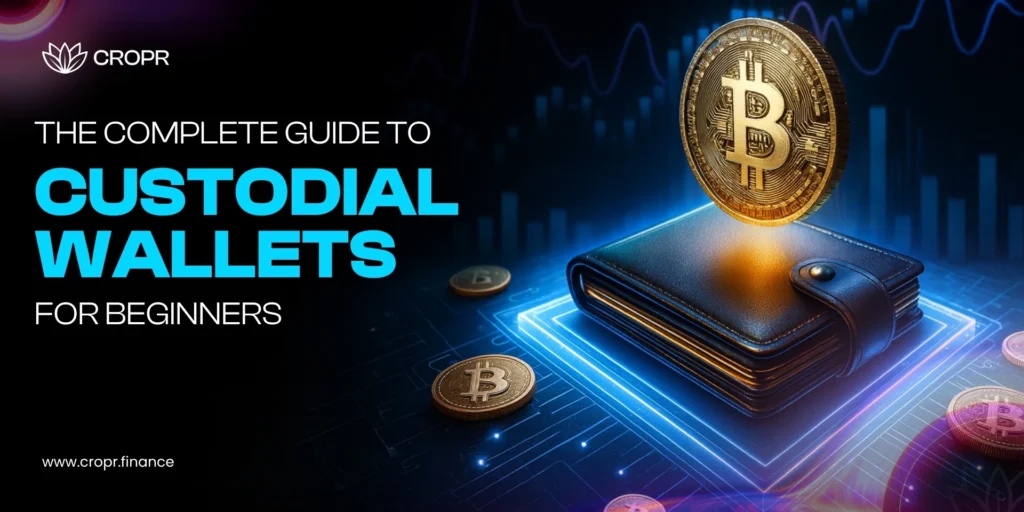As cryptocurrency becomes more widely adopted, the tools used to manage digital assets are evolving with it. At the heart of this infrastructure lies the cryptocurrency wallet, a fundamental component that enables users to store, send, and receive digital currencies. Among the different types of wallets available, custodial wallets are often recommended for beginners and businesses. But what exactly are they, and how do they differ from non-custodial options?
Let’s break this down from the ground up.
What is a Custodial Wallet?
A custodial wallet is a type of digital wallet where a third party, typically a cryptocurrency exchange or wallet provider, holds and manages the user’s private keys on their behalf. In simple terms, the user doesn’t have full control over the wallet’s security credentials. Instead, the custodian handles private key management, transaction broadcasting, and recovery mechanisms.
This setup is comparable to a traditional bank account. The assets are yours, but the service provider maintains access, handles security protocols, and facilitates the transactions you initiate.
For many users, this arrangement offers a level of convenience and protection that can outweigh the loss of control.
How Custodial Wallets Work
When you sign up for a custodial wallet, you’re essentially creating an account with a service provider who manages the backend of your wallet. You can:
- Store a variety of cryptocurrencies
- Access your funds from any device
- Recover your wallet if you lose access credentials
Because the provider handles the crypto custody, your experience often mirrors that of a fintech application. You’re dealing with usernames, passwords, and 2FA, not manually handling private keys or writing down seed phrases.
This is particularly useful for individuals new to cryptocurrency, as well as businesses seeking reliable, compliant wallet solutions that eliminate the need for complex infrastructure management.
Custodial Wallet vs Non-Custodial Wallet
This distinction is critical. In a non-custodial wallet, you alone control your private keys. That means you’re responsible for securing your seed phrase and managing all aspects of the wallet, including recovery.
On the other hand, custodial wallets transfer that responsibility to the service provider. You can reset your password if you forget it, and recovery tools are built in. However, this convenience also means that if the service provider suffers a breach, your funds could be at risk.
Here’s a simplified crypto wallet comparison:
| Feature | Custodial Wallet | Non-Custodial Wallet |
| Control over private keys | No | Yes |
| Ease of use | High | Medium to Low |
| Recovery support | Yes | No |
| Suitable for businesses | Yes | Often not preferred |
| Risk of third-party breach | Yes | No |
This difference matters even more when engaging with DeFi, where wallet security and full control are vital for interacting with smart contracts. But not every use case demands that level of independence.
Benefits of Custodial Wallets
For many users, especially those entering crypto through exchanges or portfolio apps, custodial wallets are the default option. And that’s not necessarily a bad thing.
- Ease of Use: There is no need to understand the technical details of seed phrases, key pairs, or gas fees.
- Security Features: Leading custodial providers implement enterprise-grade security such as multi-signature authorization, real-time monitoring, withdrawal limits, and geofencing.
- Recovery Mechanism: Forgot your password? No panic. You can initiate a recovery through standard authentication steps.
- Compliance and Support: Crucial for institutions, custodial services often adhere to KYC and AML regulations. They also provide customer support, something non-custodial users don’t have.
- Integration with Fiat Systems: Many custodial wallets support bank transfers, credit card purchases, and seamless conversions between cryptocurrencies and fiat currencies.
Integrating Custodial Wallets with DeFi Access
Historically, custodial wallets have been viewed as incompatible with decentralized finance (DeFi). After all, the ethos of DeFi is self-custody and decentralization. But the ecosystem is adapting. New tools are emerging that allow custodial wallets for DeFi access through secure bridges and delegated signing mechanisms.
Platforms now offer hybrid solutions that allow users to interact with protocols while maintaining the security and ease of a custodial environment. This approach is gaining traction among institutions and everyday users who want DeFi access without the full burden of managing their own wallets.
CROPR is Launching Custodial Wallets Soon
At CROPR, we recognize that not every DeFi user wants or needs to manage private keys manually. That’s why we’re introducing custodial wallet functionality as part of our upcoming product expansion.
Our goal is simple: Make DeFi approachable without compromising on security. Whether you’re tracking multiple wallets, farming LPs, or managing assets across chains, CROPR’s custodial wallet will provide a smoother and safer experience.
Designed with both beginners and professionals in mind, our solution strikes a balance between usability and powerful features, including transaction previews, unified asset views, and automated strategy tracking.
Try out our demo now to experience how simple secure crypto custody can be.
Final Thoughts: Should You Use a Custodial Wallet?
There’s no one-size-fits-all answer. If you’re just starting or building something for users, a custodial wallet is likely the best type of crypto wallet to begin with. It simplifies everything from onboarding to security. However, if you’re an advanced user seeking complete control and direct access to the protocol, a non-custodial wallet may be a better fit.
Still unsure? That’s normal. The key is understanding what you’re trading off: control vs convenience, autonomy vs support.
As the crypto space grows more sophisticated, wallet types will continue to evolve. But for now, custodial wallets remain a strong entry point for many and they’re only getting better.
Ready to simplify your crypto experience?
Explore CROPR’s custodial wallet features and try the demo today.

